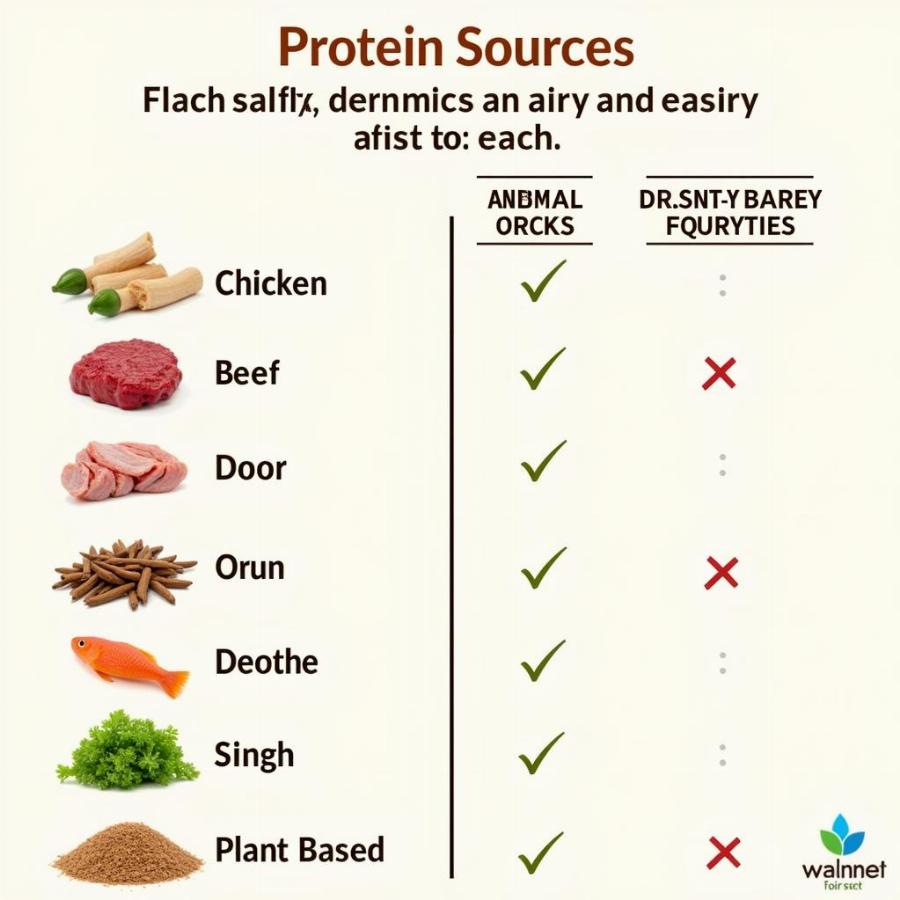Lower protein dog food has become a topic of interest for many pet owners. Are you considering a lower protein diet for your furry friend? Understanding the nuances of lower protein dog food is crucial for making informed decisions about your dog’s nutritional needs. This guide will delve into the reasons why a dog might need a lower protein diet, how to choose the right one, and potential benefits and risks.
Why Consider Lower Protein Dog Food?
Certain medical conditions, such as kidney disease and liver shunts, can necessitate a lower protein intake for dogs. By reducing the workload on these organs, a lower protein diet can help manage the symptoms and progression of these diseases. However, it’s crucial to remember that not all dogs benefit from a low protein diet. For healthy adult dogs, protein is essential for building and maintaining muscle mass, supporting a healthy immune system, and providing energy.
Choosing the Right Lower Protein Dog Food
Selecting the appropriate lower protein dog food involves more than just checking the protein percentage. The quality of the protein source, the overall balance of nutrients, and your dog’s specific needs are all important factors. Look for dog foods that specify the protein sources, opting for high-quality animal-based proteins whenever possible.  Protein Sources for Dogs Consulting with your veterinarian is crucial before switching your dog to a lower protein diet. They can assess your dog’s health, determine the appropriate protein level, and recommend suitable food options.
Protein Sources for Dogs Consulting with your veterinarian is crucial before switching your dog to a lower protein diet. They can assess your dog’s health, determine the appropriate protein level, and recommend suitable food options.
Benefits and Risks of Lower Protein Diets for Dogs
While lower protein dog food can be beneficial for dogs with specific medical conditions, it also carries potential risks. For instance, a diet too low in protein can lead to muscle loss, a weakened immune system, and other health problems. This is especially important for puppies and young dogs, who require higher protein levels for growth and development. non prescription low protein dog food
Is a Lower Protein Diet Right for My Dog?
This depends entirely on your dog’s individual health status. If your dog is healthy, a standard, balanced diet with adequate protein is usually best. However, if your dog has a medical condition that requires protein restriction, a lower protein diet can be a valuable tool in managing their health.
How Much Protein Does My Dog Need?
The ideal protein intake for a dog varies depending on age, activity level, and health status. Your veterinarian can determine the appropriate protein level for your dog.
What Are the Signs of Protein Deficiency in Dogs?
Signs of protein deficiency can include weight loss, muscle wasting, a dull coat, and decreased energy levels. reviews on pure harmony dog food If you notice these signs, consult your veterinarian immediately.
Can I Make Homemade Lower Protein Dog Food?
While it is possible to make homemade lower protein dog food, it’s essential to work with a veterinary nutritionist to ensure the diet is balanced and meets your dog’s specific nutritional needs.
Expert Insights
“Lower protein diets are not a one-size-fits-all solution,” says Dr. Emily Carter, DVM. “They should only be implemented under the guidance of a veterinarian to ensure they meet the dog’s individual health needs.” Dr. Michael Davis, a board-certified veterinary nutritionist, adds, “Careful monitoring of the dog’s weight, muscle mass, and overall health is essential when feeding a lower protein diet.” best dog food for great pyrenees
Conclusion
Lower protein dog food can be a crucial part of managing certain medical conditions in dogs. However, it’s vital to consult with your veterinarian before making any dietary changes. Choosing the right lower protein dog food and carefully monitoring your dog’s health are essential for ensuring their well-being. is chicken meal good for dogs Remember, a balanced diet tailored to your dog’s individual needs is the key to a long and healthy life.
FAQ
- What are some examples of low protein dog treats? Fruits and vegetables like carrots, apples (without the core and seeds), and green beans can be good low-protein treat options. Always consult with your vet before introducing new treats.
- How do I transition my dog to a lower protein diet? Gradually introduce the new food over several days to a week, mixing it with their current food to avoid digestive upset.
- Are there any specific brands of lower protein dog food you recommend? It’s best to discuss specific brand recommendations with your veterinarian, as the ideal choice depends on your dog’s individual needs.
- Can senior dogs benefit from lower protein dog food? Not necessarily. While some senior dogs may have kidney issues requiring a lower protein diet, many still require adequate protein for muscle maintenance.
- What are the long-term effects of a lower protein diet? The long-term effects depend largely on the reason for the diet and how well the dog’s overall nutritional needs are being met. Regular veterinary checkups are essential to monitor the dog’s health.
- Can a lower protein diet help with allergies? Sometimes. While not always the solution, a lower protein diet with a novel protein source can sometimes help manage food allergies. gentle giants dog food reviews
- What if my dog refuses to eat lower protein dog food? Try different flavors, textures, or even warming the food slightly. If the problem persists, consult with your vet.
Beaut Dogs is your trusted source for all things related to dog care. We offer comprehensive information on various dog breeds, health, nutrition, and training. For personalized advice and detailed answers to your dog care questions, contact us at Email: [email protected]. Beaut Dogs is committed to providing reliable and insightful information to help you give your furry companion the best possible care. Visit us at https://beautdogs.com for more expert advice and resources.